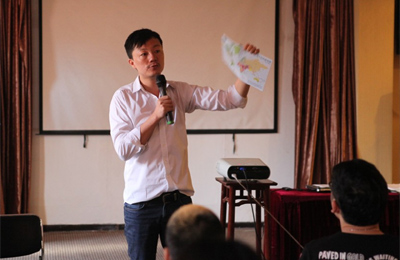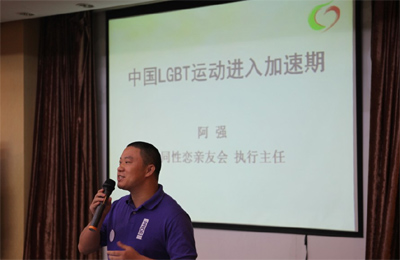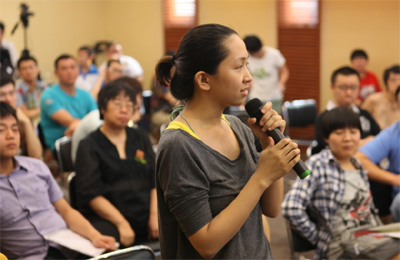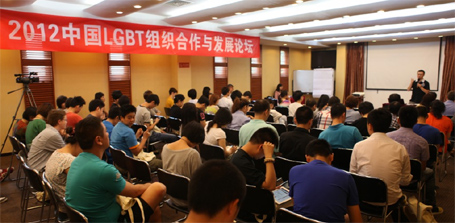The following video was produced by Queer Comrades, China's only long-running non-profit LGBT webcast, and was released yesterday.
On 16 and 17 June 2012, more than 80 LGBT (Lesbian, Gay, Bisexual, Transgender) activists, representing 53 organisations and over 23 different regions from as far-away areas as Tibet and Xinjiang gathered in Beijing for the conference. It was hosted by the Beijing Gender Health Education Institute. The theme of the conference was "Cooperation and Development of LGBT organisations".
The press release noted the participation of communities whose "voice remains largely underrepresented in China's LGBT movement" including representatives of the lesbian, gay and straight community as well as leaders of organisations focusing on wives of gay men. The issues discussed included bisexuality, transgender issues, disabled LGBTs, parents of LGBTs, SM (sado-masochism) practices, sex workers and HIV/AIDS.

Executive Director of the Beijing Gender Health Education Institute Xiaogang Wei.
He is also the founder and director of Queer comrades.

Executive Director of PFLAG China Ah Qiang

Chinese Lala Alliance Representative Ana Huang.
All photos are courtesy of Queer Comrades.
It further noted:
"Focusing on the topic 'Cooperation and Development of Chinese LGBT Organisations,' the conference saw intense debates about the development of ideas, tactics and future directions for the LGBT movement in China, and about problems and difficulties LGBT organisations are currently facing in their development and their collaboration with other organisations. The conference participants took the 2-day conference as an opportunity to map out the current position of LGBT organisations in China, to intensify communication about strengthening organisational development through cooperation, and to promote a more diversified and more invasive Chinese LGBT movement.
"The conference consisted of three keynote speeches, nine workshops on different themes and a plenary debate. The conference also saw the premiere of the new documentary "Mama Rainbow" by queer filmmaker Fan Popo, which features six mothers from all over China, who talk openly and freely about their experiences with their homosexual children. The conference was hosted by the Beijing Gender Health Education Institute.
"Ah Qiang, the executive director of the Guangzhou organisation PFLAG China (Parents, Friends and Families of Lesbians & Gays) opened the conference with a keynote speech entitled, 'The Acceleration of the Chinese LGBT movement.' In his speech, he affirmed that the LGBT community has slowly acquired a solid presence within mainstream society during the last few years. He emphasised that LGBT organisations should continue to pay attention to the needs of their communities saying, 'I'm always weary of organisational thinking which emphasises projects instead of people. Chinese LGBT organisations need to understand that our work shouldn't be lead by a search for funds - it should be lead by our concern for our people.' He continued by emphasising collaboration efforts with the government and society as a whole, and by urging the LGBT movement to always use a broader human rights angle to pursue its goals - failing to do so would put the LGBT movement in a dubious light.
"The second keynote speech was given by Xu Bin, the director of the Beijing LBT organisation Common Language. In a talk entitled 'Looking Back, Moving Forward', she discussed the history of the Chinese LGBT movement, pointing out which communities have remained largely overlooked throughout the movement's course, and advocating a more diversified path for the future. 'Some voices, like male gay voices, or voices of Beijing-based lesbian organisations, are more powerful than others. When we're using these powerful, subjective voices of ours, are we also paying attention to more marginalised communities?' she said.
To read the release in full, please click here.

